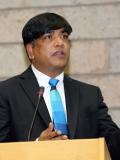
Governments around the world are pioneering innovative policies that reduce trade-offs and create positive synergies across and between the water, energy and food sectors.

The "Experimental Ecosystem Accounting" in Uganda project generated a set of natural capital accounts that can support knowledge-based policymaking for improved biodiversity management.

"The concept of natural capital is more relevant than ever, and we need better measurement and credible valuation of natural capital in order to integrate these natural assets into our everyday production and consumption decisions," says Pusham Kumar, Senior Economic Advisor at UN Environment.

"Stranded (carbon) assets are highly relevant to discussions on sustainable infrastructure. Any investment in infrastructure that does not consider future developments such as decarbonization will risk becoming stranded and hence a liability to investors," says Alexander Pfeiffer, PhD candidate at the School of Geography and the Environment at the University of Oxford.

To make the most of Ontario’s green transition, governments, employers, unions and non-profit organizations should work together to develop a comprehensive “Just Transition Strategy” that addresses decent work considerations at all stages.

The transition to a green economy is happening irrespective of government direction. It’s being driven by citizens and business and by global trends. Policymakers need to anticipate these impacts and ensure that policies and programs are in place to harness the full strength of the workforce.

His excellency Ambassador Alvaro Cedeño Molinari is the current Permanent Representative of Costa Rica to the World Trade Organization (WTO). He has graciously accepted to share with the GGKP his statement from the World Trade Organization (WTO) General Council Meeting on 24 October 2017 on the future of world trade.

The Sustainable Asset Valuation (SAVi) facility brings sustainable development knowledge from UN roundtables to the desks of infrastructure investors.

With our ecosystems, our climate, and our societies all straining to cope with the economic pressures of the 21st century, the need for green economies is more urgent that ever before. This primer charts the journey and latest thinking on what green economy means in 2017 - with lots of handy links if you're interested in learning more.

Making the world’s energy and infrastructure safe and sustainable for the future is going to take money – lots of money. Are green bonds a sign that financial markets are starting to mobilise?
